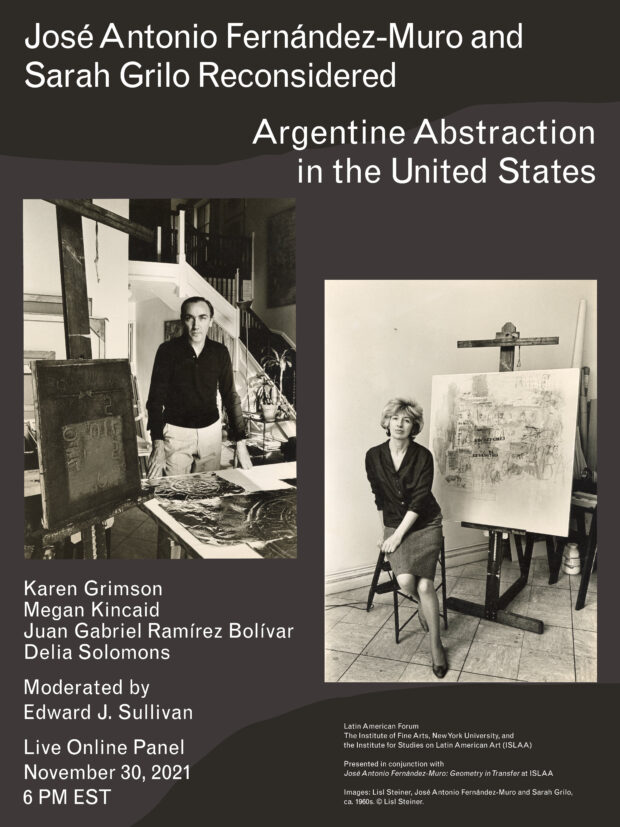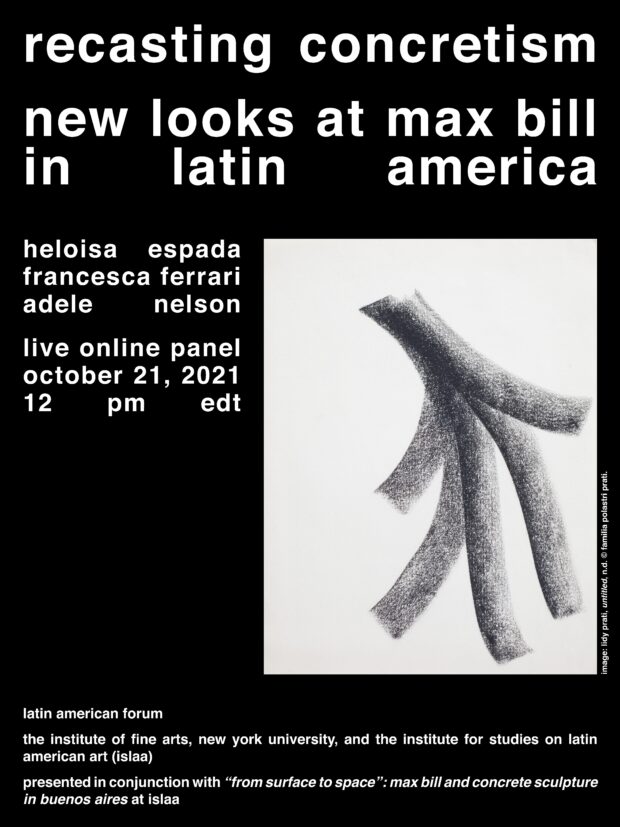LATIN AMERICAN FORUM, FALL 2021
José Antonio Fernández-Muro and Sarah Grilo Reconsidered:
Argentine Abstraction in the United States
Tuesday, November 30, 6 PM EST
Live on Zoom
In English
Register
During their lifetimes, Argentine artists Sarah Grilo (1919–2007) and José Antonio Fernández-Muro (1920–2014) made significant contributions to global abstraction. Forming part of a generation of artists working in Buenos Aires following the emergence of concrete art in the 1940s, this married couple offered distinct stylistic contributions that helped expand the genre. Their work was shown internationally, and they served as emissaries of the Argentine avant-garde at notable exhibitions and biennials. At the height of their prominence in Argentina, Grilo and Fernández Muro relocated to New York in 1962, where they continued to push abstraction beyond its previous boundaries.
This panel will present new scholarship on the activity of Grilo and Fernández-Muro in New York, considering both their individual artistic developments and their role in relation to Latin American art’s reception in the United States during the 1960s. Grappling with existing interpretations of their careers that celebrate their time in New York as a breakthrough moment, this panel will examine their achievements through alternate methodological and historical approaches that displace the center-periphery narrative, while also considering questions of race, nationality, and gender.
In her presentation, Megan Kincaid will introduce her research for the exhibition José Antonio Fernández-Muro: Geometry in Transfer at the Institute for Studies on Latin American Art (ISLAA), locating the New York years within Grilo’s and Fernández-Muro’s sweeping careers. Delia Solomons will then contextualize how their work circulated within the surge of survey exhibitions dedicated to Latin American art in the United States amid inter-American Cold War frictions between 1959 and 1968. In his lecture, Juan Gabriel Ramírez Bolivar will trace the evolution of the circle as a geometric and figurative device across Fernández-Muro’s New York paintings. Karen Grimson will then present on Grilo’s work from 1962 to 1970, explicating how her use of language, initiated during her New York residency, functioned as a proclamation of discursive agency. The presentations will be followed by a discussion moderated by Edward J. Sullivan.
The program is organized in conjunction with José Antonio Fernández-Muro: Geometry in Transfer, curated by Megan Kincaid, at ISLAA.
ABOUT THE SPEAKERS
Karen Grimson is an art historian specializing in Latin American abstraction. She holds a degree in art history from the Universidad de Buenos Aires and an MA from the Courtauld Institute, London. Between 2011 and 2020, she worked at the Museum of Modern Art, New York, developing acquisitions and exhibitions of art from Latin America. Her writings on the work of Sarah Grilo have been published by ISLAA and Galerie Lelong, Paris. She also contributed articles to the publications Among Others: Blackness at MoMA, Joaquín Torres-García: The Arcadian Modern, Being Modern, and MoMA Highlights, as well as the online portals MoMA Magazine and post: notes on art in a global context.
Megan Kincaid is an art historian and curator of modern and contemporary art. She is currently an adjunct instructor at New York University and a Ph.D. candidate at The Institute of Fine Arts, New York University. She holds a BA in art history from Columbia University, summa cum laude, Phi Beta Kappa. Kincaid co-curated the exhibitions Cauleen Smith, H-E-L-L-O: To Do All At Once (2021) and Fanny Sanín’s New York: The Critical Decade, 1971–1981 (2020–21), both at The Institute of Fine Arts, New York University, and assisted with the curation of Charles White: A Retrospective (2018–19) at the Museum of Modern Art, New York. The Museum of Modern Art and New York University, among others, have published her writing. Most recently, she organized an exhibition of early drawings by Susan Te Kahurangi King and published an essay on new sculptures by Daniel Lind-Ramos.
Juan Gabriel Ramírez Bolívar is a Ph.D. Candidate at The Institute of Fine Arts, New York University. He focuses on modern Latin American art and artistic exchanges between Europe and Latin America. Born in Bogotá, Juan Gabriel received his BA in history at the Universidad Nacional de Colombia. In 2013, he was granted an Erasmus Mundus Scholarship to study at the master’s program in comparative history at Charles University in Prague and social sciences at the School for Advanced Studies in Social Sciences (EHESS) in Paris. At the Institute, he has organized numerous events with IFA Latin America and has been part of the editorial board of the peer-reviewed journal Lapis: The Journal of the Institute of Fine Arts.
Delia Solomons is Assistant Professor of Art History at Drexel University. She specializes in modern and contemporary art of the Americas, focusing on intersections between exhibitions, politics, and visual culture in the 1960s. Her research has appeared in Art Bulletin, MoMA’s post: notes on art in a global context, Journal of Curatorial Studies, and The Americas Revealed: Collecting Colonial and Modern Latin American Art in the United States. Her book x Cold War in the White Cube: U.S. Exhibitions of Latin American Art (1959–68) will be published by Penn State University Press in 2023. Her most recent research is devoted to Marisol’s sculpture.
—
Recasting Concretism: New Looks at Max Bill in Latin America
A Panel with Heloisa Espada, Francesca Ferrari, and Adele Nelson
Tuesday, October 21, 12 PM EDT
Live on Zoom
In English
Register
The Swiss artist Max Bill (1908–1994) has long been understood as a principal source for the theory and practice of Latin American abstract artists in the 1940s and 1950s, especially in Brazil and Argentina. This narrative, which pervades the literature on the history of concretism in the region, consistently casts Bill as a staunch defender of rationalism and even as the harbinger of a certain formal rigidity.
This panel challenges these assumptions, recasting Bill’s role in the shaping of Latin American concretism and reassessing his contributions in light of his Brazilian and Argentine peers’ interpretation of concrete art. It disputes the straightforward conflation of Bill’s approach to form with that of his counterparts in the region and reassesses Bill’s interest in mathematical structures in terms of irregular, non-Euclidean notions of space and the viewer’s sensory activation.
After Francesca Ferrari introduces her research for the exhibition “From Surface to Space”: Max Bill and Concrete Sculpture in Buenos Aires, on view at the Institute for Studies on Latin American Art (ISLAA), Heloisa Espada will discuss the contradictions between Bill’s positions and the narratives that describe him as a propagator of strict ideas about concrete art in her lecture “Max Bill: Radical for Whom?” Adele Nelson will then present her talk “Max Bill or Bust: Complicating Brazilian Concretism,” which will reveal how form, as conceived by Brazilian thinkers and makers, stood counter to Bill’s thinking and instead signaled an innovative merging of media.
This program is organized in conjunction with “From Surface to Space”: Max Bill and Concrete Sculpture in Buenos Aires, curated by Francesca Ferrari, at ISLAA, a complementary exhibition to max bill global at the Zentrum Paul Klee.
ABOUT THE SPEAKERS
Heloisa Espada is curator at Instituto Moreira Salles, Brazil. She specializes in modern and contemporary Brazilian art, with a special focus on its relationship with photography. Espada is author of Hercules Barsotti (2013) and Monumentalidade e sombra: o centro cívico de Brasília por Marcel Gautherot (2016). She has organized the exhibitions Geraldo de Barros e a fotografia (2014) and Conflitos: fotografia e violência política no Brasil, 1889-1964 (2016), among others. Currently, she is a fellow in the Latin American Collection Fellowship Program of the Patricia Phelps Cisneros Research Institute for the Study of Art in Latin America of MoMA, where she is conducting research about the Ruptura group.
Francesca Ferrari is a Ph.D. Candidate at New York University’s Institute of Fine Arts, where she is a recipient of the Robert Lehman Fellowship for Studies in the Fine Arts. She holds an MA in art history from the University of Pennsylvania and a BA in art history and English from the Université de Lausanne. Her research focuses on twentieth-century European and Latin American art. Her dissertation, tentatively titled “Animated Geometries: Abstraction and the Body in the Work of Paul Klee, Sophie Taeuber, Joaquín Torres-García, and Alexandra Exter,” explores the convergence of geometric abstraction, the human body, and movement on a transnational scale during the 1920s. She has published in several graduate art history journals as well as in Afterimage and the Yale University Art Gallery Bulletin. Ferrari is the 2020/2021 Mellon-Marron Research Consortium Fellow in the Department of Painting and Sculpture at the Museum of Modern Art.
Adele Nelson is Assistant Professor of Art History and Associate Director of the Center for Latin American Visual Studies at the University of Texas at Austin. She specializes in postwar and contemporary art of Latin America, with a focus on Brazil, and her writings have appeared in Art Journal, Artelogie, ARTMargins, MODOS, and various museum publications. Her new book, Forming Abstraction: Art and Institutions in Postwar Brazil, will appear in January 2022 in the Studies on Latin American Art series from the University of California Press. Her research has been supported by the Fulbright US Scholar Program, the National Endowment for the Humanities, and the American Philosophical Society.

